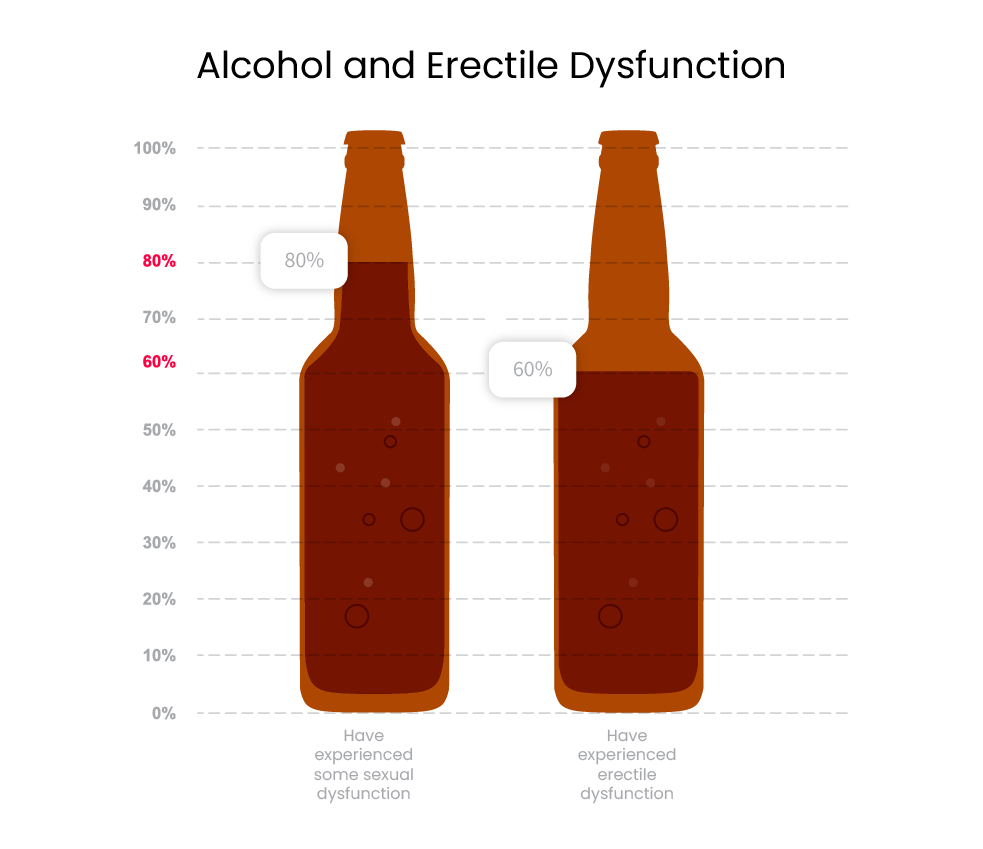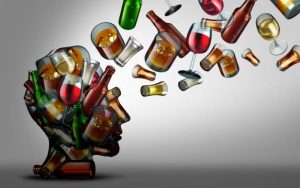Alcohol and Sexual Performance
03.01.2022 - Vertica® experts | 01.11.2023
It was the famous British playwright, William Shakespeare, who claimed that: “Alcohol provokes the desire but takes away your performance”. Read on to find out more about how alcohol affects male sexual health, desire and functioning
Millions of people around the world enjoy alcohol on a regular basis, so if you are also in the habit of drinking from time to time, you are definitely in good company. In fact, for many people having a drink is a pleasant way of relaxing, socializing with friend and co-workers or simply decompressing at the end of a busy day. And while various health experts agree that small portions of alcohol, especially red wine, might have certain health benefits, there is great importance as to how much we drink. Moderate drinking can actually lower inhibitions, enhance libido and even the sense of wellness and self-esteem – at least in the short term. But alcohol can have a negative impact on the body’s short and long-term health, including on one’s sexuality. This is the reason why most doctors advise to limit the weekly alcohol consumption to no more than 14 units.
About Alcohol-Induced Erectile Dysfunction
Between alcohol and sex there is a complex relationship. For example, according to a study which looked at behavior-induced erectile dysfunction, and was published in the Journal of Sexual Medicine, consuming alcohol moderately (1-2 units daily) may, on one hand, increase sexual desire, and on the other- decrease performance anxiety. These two parameters can significantly improve sexual intercourse, especially erectile dysfunction. However, excessive drinking has the exact opposite impact on male sexual function.
Alcohol induced erectile dysfunction is usually (but not always) a temporary condition, which happens when men drink excessive amounts of alcohol prior to sexual intercourse. In this situation, the man will usually have problems maintaining an erection in a manner which will make penetrative sex impossible: he may get only partial erection or none at all.
Why Does It Happen?
Erectile dysfunction is usually the result of multiple factors, and it can be difficult, from a scientific perspective, to isolate one variable from all the rest in order to study it. Notwithstanding this difficulty, researchers generally agree that excessive alcohol drinking affects male sexual function in the following mechanisms:
-
Inhibiting effect on the central nervous system
Alcohol (as well as nicotine, caffeine and other addictive substances) has a psychoactive effect that might affect sexual functioning1. The Central Nervous System (CNS) is made up of the brain and spinal cord, and when it is inhibited (depressed) its functions slow down, including thinking and reasoning, reaction times, motoric skills and coordination. Consequently, the neural signals between the brain and penis likewise slow down considerably and thus erections might take much longer to attain. Alternatively, neural communication might fail completely, and manifest in a temporary inability to attain an erection. This situation may last for a few hours, until full function is gradually restored upon regaining sobriety.
These episodes of erectile dysfunction are considered common enough, especially among men who regularly consume more than three units of alcohol (12 grams ethanol) daily. However, excessive prolonged alcohol consumption, which leads to addiction, might even cause neural penile damage resulting in permanent erectile dysfunction.
-
Effect on the blood flow to the penis
Alcohol has a vasodilating effect on the blood vessels, thus in high quantities it may manifest in decreased blood pressure. Additionally, alcohol is a diuretic and excessive urination decreases the blood volume in the body. All these factors affect the ability to get an erection, as erections require a considerable blood volume and blood flow to the penis. Lastly, dehydration coupled with the consequent blood pressure reduction might trigger an increase in the level of angiotensin – a hormone which promotes blood vessels constriction, and this might further limit blood flow to the penis.
What About Chronic Excessive Alcohol Consumption?
Chronic excessive alcohol consumption can affect, either directly or indirectly, almost every organ system in the body2. Studies3 have found that the prevalence of serious erectile dysfunction among alcoholic men, is three times more than in non-alcoholic men of the same age. In a study4 which interviewed 44 alcoholic men, it was found that 59% experienced ED during periods of heavy drinking and 84% reported some sexual dysfunction related to alcohol abuse, particularly significant decrease in sexual desire. Other types of sexual dysfunction included ejaculation problems (premature, delayed or absent ejaculation). Therefore, chronic excessive alcohol consumption might interfere with all the phases of the male sexual response, especially sexual desire and erectile function5.
In tests6 designed to evaluate nocturnal penile rigidity it was found that alcoholic men were more likely to have fewer, slower and less rigid nocturnal erections than nonalcoholic men. Another study suggested that many alcoholics suffered from erectile dysfunction even after years of sobriety, possibly due to the permanent neurological damage caused by long-term alcohol use. Some long-term male alcoholics may likewise experience a feminization syndrome, characterized by testicular shrinkage (atrophy), decreased bodily hair and enlarged breasts (gynecomastia). These phenomena, in addition to erectile dysfunction, are associated with advanced liver cirrhosis7.

Why Does It Happen?
The main reason relates to the effect which excessive chronic drinking has on the liver, and a disruption in the metabolism of male hormones which affect sexual function:
- When drinking alcohol, the body breaks down the ethanol it contains. This causes a reduction in the amount of a coenzyme called NAD+, that plays a role in testicular testosterone production and in its metabolism in the liver.
- Among alcoholic men a reduction in blood testosterone levels was found, due to enhanced enzymatic processes in the liver, which accelerate the rate of testosterone breakdown and clearance.
- Continuous excessive alcohol consumption might cause among men an increase in the female sex hormone estrogen. At the same time there can be an increase in the hormone cortisol, which promotes the breakdown of testosterone and inhibits its production in the testicles8.
- Excessive chronic alcohol consumption might interfere with the sleep cycle and consequently compromise the body’s ability to produce testosterone.
The decrease in testosterone levels may likewise affect sexual function as well as the libido, and it might also interfere with sperm production in the testicles and cause fertility problems.
To conclude, long-term excessive alcohol consumption might affect the various aspects associated with male sexual health. While consuming one or two alcoholic drinks daily won’t cause any harm, excessive drinking might influence testosterone levels and all the stages of the male sexual response, including sexual desire, arousal and ejaculation.
[1] https://www.researchgate.net/publication/274924862_Alcohol_Dependence_and_Sexual_Dysfunction_a_clinical_review↩
[2] https://core.ac.uk/download/pdf/82131458.pdf↩
[3] O’Farrell TJ, Kleinke CL, Cutter HS. Sexual adjustment of male alcohol-ics: changes from before to after receiving alcoholism counseling with and without marital therapy. AddictBehav 1998;23:419–25.↩
[4] Mandell W, Miller CM. Male sexual dysfunction as related to alcohol consumption: a pilot study. Alcohol Clin Exp Res 1983;7:65–9.↩
[5] https://pubmed.ncbi.nlm.nih.gov/3070052/↩
[6] nyder S, Karacan I. Effects of chronic alcoholism on nocturnal penile tumescence. Psychosom Med 1981;43:423–9.↩
[7] Leiblum SR, Rosen RC. Alcohol and human sexual response In: Powell DJ, ed. Alcoholism and Sexual Dysfunction: Issues in Clinical Management. Binghampton, New York: Haworth Press, 1984:1–16.↩
[8] https://jamanetwork.com/journals/jama/fullarticle/1029127↩
The Company hereby clarifies that the information contained on the website is for informational purposes only, and is not intended to be a substitute for professional medical and healthcare advice, and does not constitute medical advice or opinion. Always seek the advice of your physician or other qualified health provider with any medical condition or question you may have regarding a medical condition.





